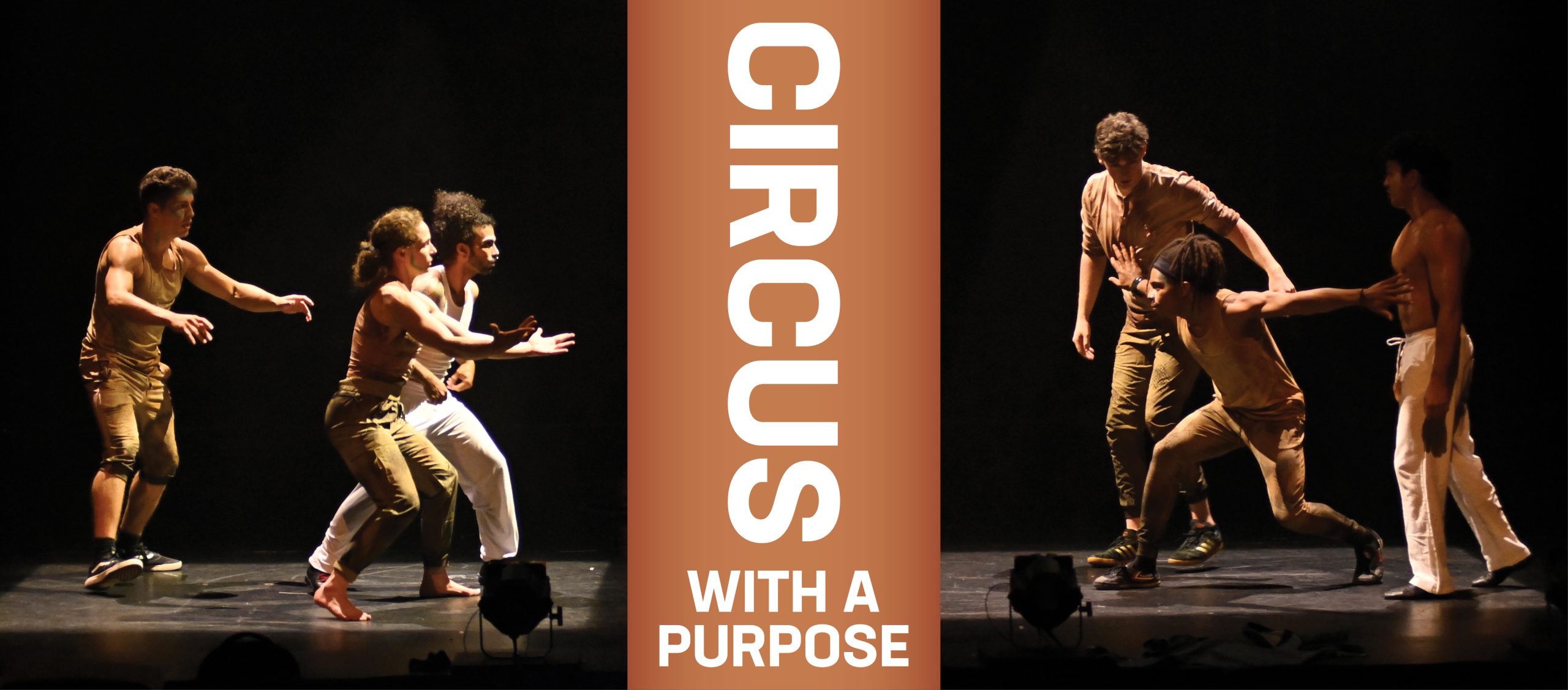
By Meg Whalen
Photos by Kat Lawrence
Associate Professor of Theatre Carlos Cruz unleashes “La Bestia” to explore the journey of migrants.
As the performance of “La Bestia: A Circus Journey,” comes to a close, the audience is on its feet cheering, whistling and applauding. For more than an hour, the people filling uptown Charlotte’s Blumenthal Performing Arts Center’s Booth Playhouse have witnessed breathtaking feats of skill and daring, and they are eagerly showing their admiration.
But the show is not over. Slowly the players, members of the Nouveau Sud Circus Project, walk across the darkly lit stage, and one player begins to ascend another, climbing to stand on his shoulders. As she steadies herself and her compatriots gather around, a third player comes from behind to scale the human ladder. It is not easy. As he reaches the top and tries to stand, the bodies wobble. Someone in the audience cheers; another person whistles; the rest watch with wide eyes. Finding their balance, the three players — one on top of the other — stand tall and proud.
“More than anything, I heard the gasps and the wows,” said Associate Professor of Theatre Carlos Cruz a few days after the performances of “La Bestia” in early July. Cruz teaches physical theater, which includes commedia dell’arte and circus arts. In 2014, with a grant from the Arts & Science Council, a local funding agency, he founded Nouveau Sud, a community-engaged contemporary circus company in Charlotte. “La Bestia,” a show about immigration, is the company’s fifth production.
The obvious effort, the uncertainty that lies between the moments of wobbling and triumphant stillness, demonstrates what Cruz calls “the struggle that it is to make circus.”
By Meg Whalen
Photos by Kat Lawrence
Associate Professor of Theatre Carlos Cruz unleashes “La Bestia” to explore the journey of migrants.
As the performance of “La Bestia: A Circus Journey,” comes to a close, the audience is on its feet cheering, whistling and applauding. For more than an hour, the people filling uptown Charlotte’s Blumenthal Performing Arts Center’s Booth Playhouse have witnessed breathtaking feats of skill and daring, and they are eagerly showing their admiration.
But the show is not over. Slowly the players, members of the Nouveau Sud Circus Project, walk across the darkly lit stage, and one player begins to ascend another, climbing to stand on his shoulders. As she steadies herself and her compatriots gather around, a third player comes from behind to scale the human ladder. It is not easy. As he reaches the top and tries to stand, the bodies wobble. Someone in the audience cheers; another person whistles; the rest watch with wide eyes. Finding their balance, the three players — one on top of the other — stand tall and proud.
“More than anything, I heard the gasps and the wows,” said Associate Professor of Theatre Carlos Cruz a few days after the performances of “La Bestia” in early July. Cruz teaches physical theater, which includes commedia dell’arte and circus arts. In 2014, with a grant from the Arts & Science Council, a local funding agency, he founded Nouveau Sud, a community-engaged contemporary circus company in Charlotte. “La Bestia,” a show about immigration, is the company’s fifth production.
The obvious effort, the uncertainty that lies between the moments of wobbling and triumphant stillness, demonstrates what Cruz calls “the struggle that it is to make circus.”
“To get the audience to feel that they’re in Central America, to get them to feel that adrenaline, what it feels like to be on that journey, it’s really intense.”
Tykiique Cuthkelvin ’17
“To get the audience to feel that they’re in Central America, to get them to feel that adrenaline, what it feels like to be on that journey, it’s really intense.”
Tykiique Cuthkelvin ’17
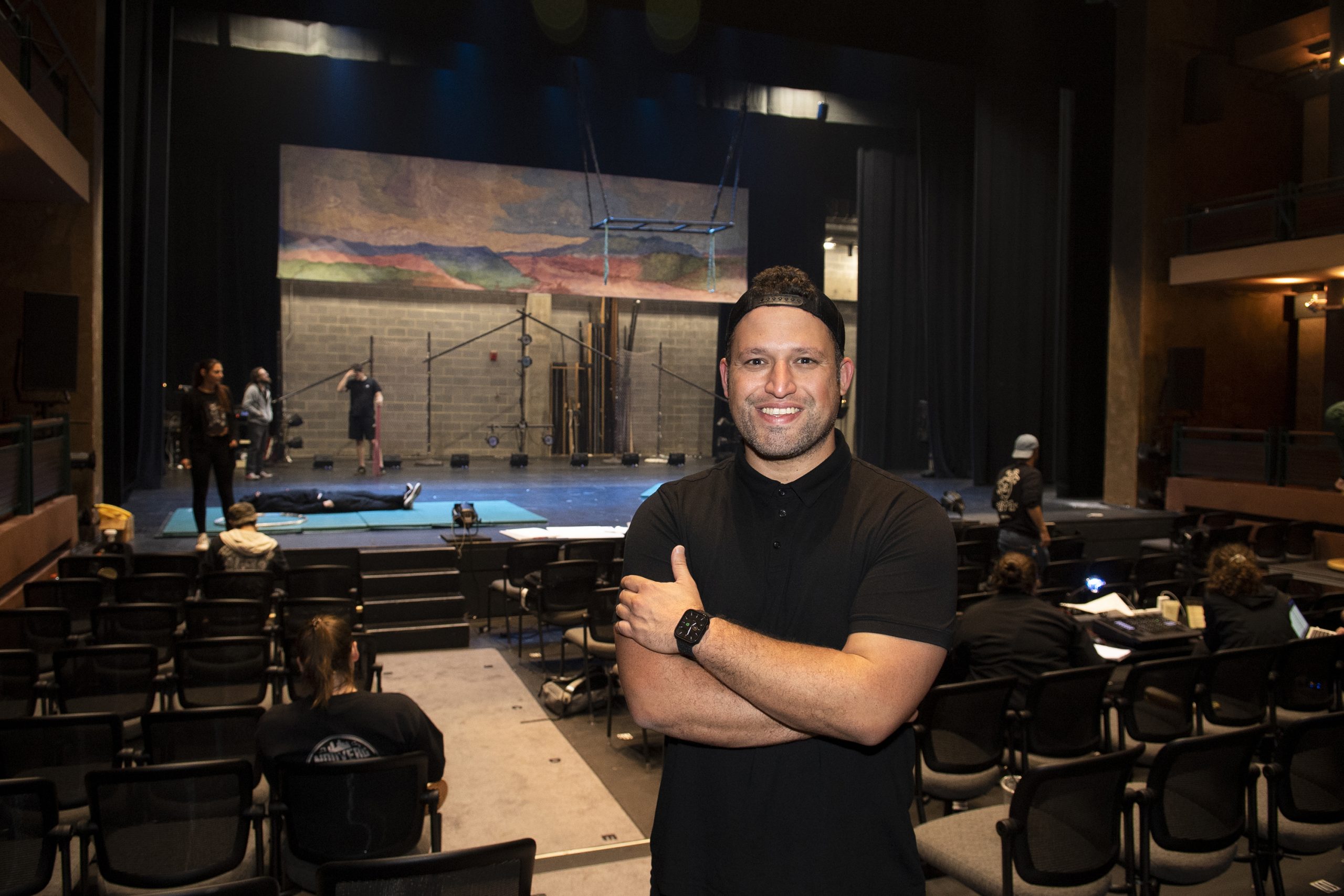
Carlos Cruz, associate professor of theatre, has received the 2023 Bonnie E. Cone Professorship in Civic Engagement.
“There is no ‘fake’ in circus. We don’t pretend anything. We don’t have the room to pretend.”
And because circus entails such physical risk and courage, it becomes an especially compelling medium to convey the migrant experience.
“What the artists are doing on stage is extremely dangerous and takes so much trust and bravery on stage,” said Krysta Rogden ’20. “It’s really the perfect way to tell this kind of story.”
Rogden, who earned a Bachelor of Arts in Dance and a minor in theatre and is currently in the Master of Public Administration program at UNC Charlotte, took Cruz’s circus arts class in 2019 and is now a Nouveau Sud company member. In 2019, she saw her first Nouveau Sud show, “Revol: The Story of a Flag.”
“It was my first time seeing circus in that kind of light. I was used to circus in a presentational format, like Cirque du Soleil. But circus can shed very powerful light on serious topics.”
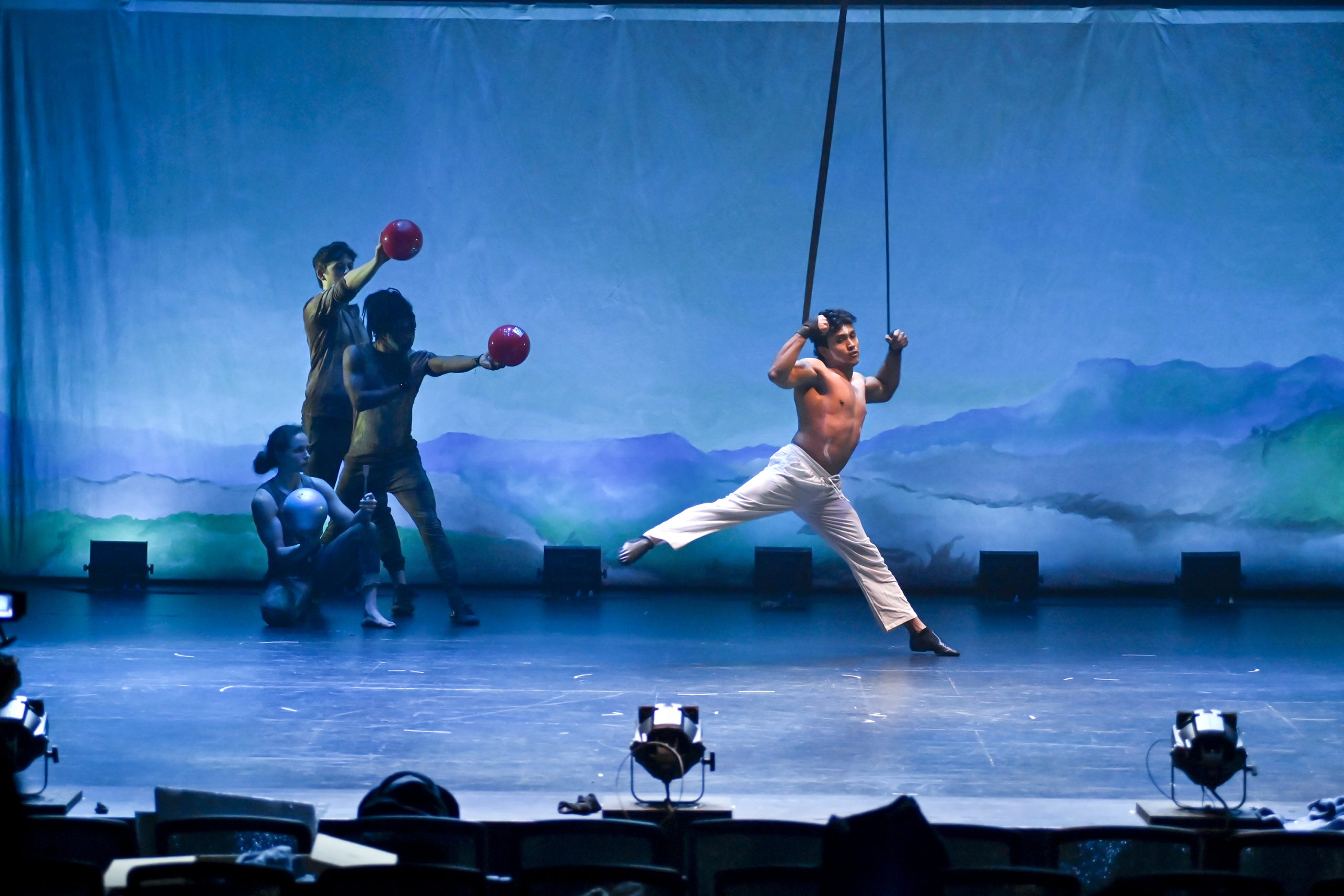

Carlos Cruz, associate professor of theatre, has received the 2023 Bonnie E. Cone Professorship in Civic Engagement.
“There is no ‘fake’ in circus. We don’t pretend anything. We don’t have the room to pretend.”
And because circus entails such physical risk and courage, it becomes an especially compelling medium to convey the migrant experience.
“What the artists are doing on stage is extremely dangerous and takes so much trust and bravery on stage,” said Krysta Rogden ’20. “It’s really the perfect way to tell this kind of story.”
Rogden, who earned a Bachelor of Arts in Dance and a minor in theatre and is currently in the Master of Public Administration program at UNC Charlotte, took Cruz’s circus arts class in 2019 and is now a Nouveau Sud company member. In 2019, she saw her first Nouveau Sud show, “Revol: The Story of a Flag.”
“It was my first time seeing circus in that kind of light. I was used to circus in a presentational format, like Cirque du Soleil. But circus can shed very powerful light on serious topics.”
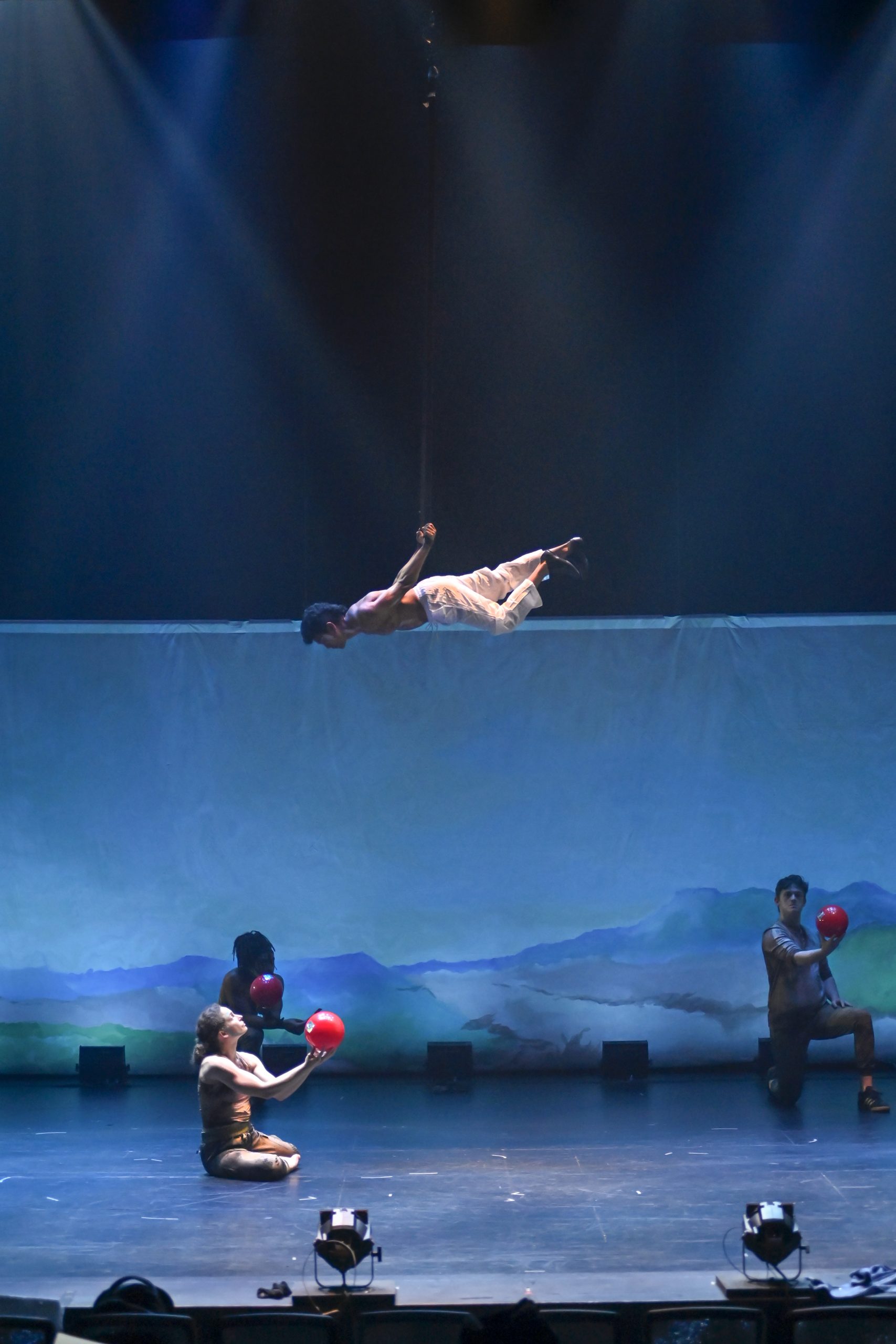

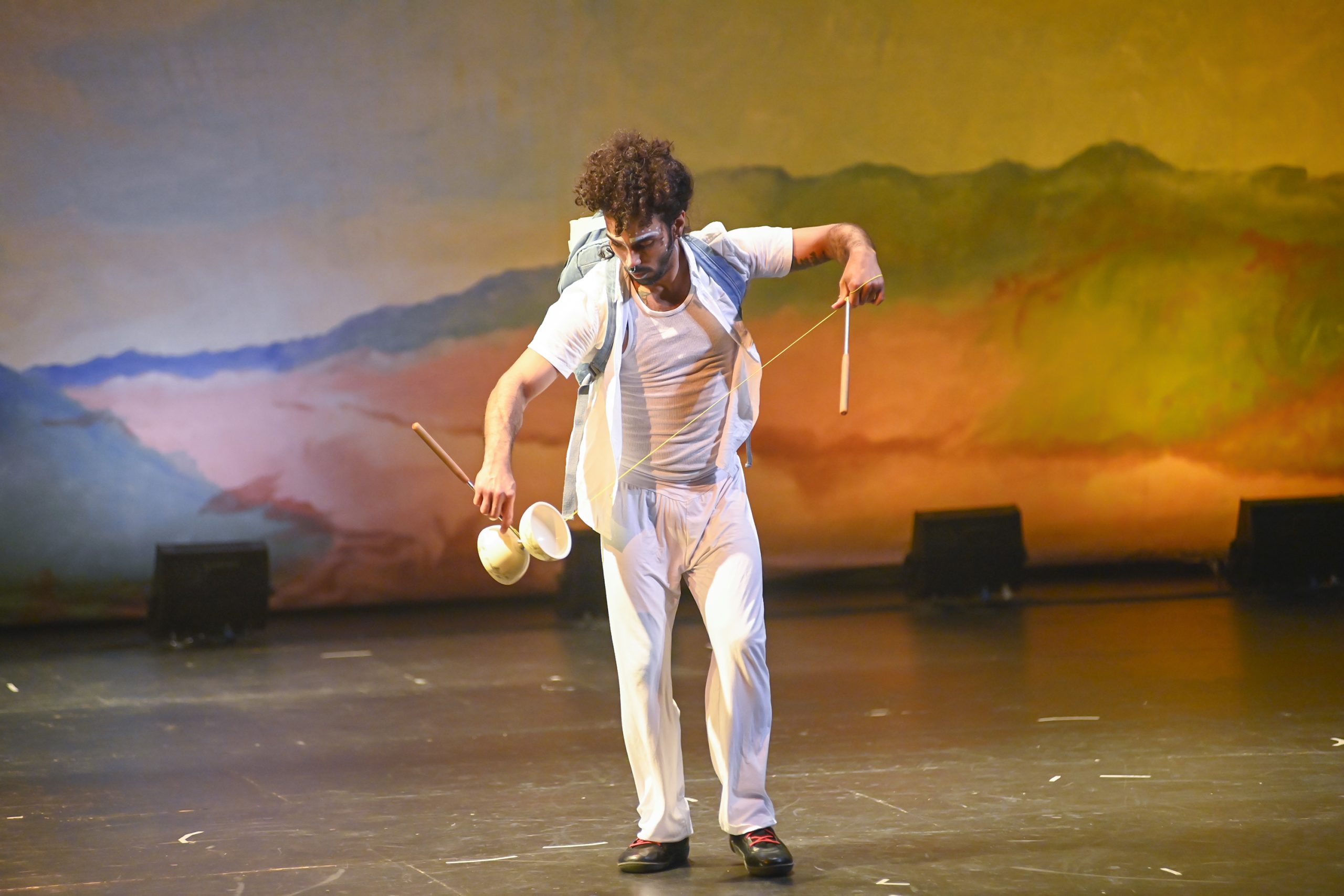
The Journey
In 2014, Cruz received a grant from the Theatre Communications Group to fund a residency in Mexico City, where he collaborated with playwright Alicia Martinez-Alvarez and the theater company Laboratorio de La Máscara to develop “Pícaro.” One evening, he and Martinez-Alvarez were watching the news and learned that more than 40 Central American migrants had been buried that day in Mexico. It was a stunning number. At the time, Cruz knew he eventually would expand beyond a single boy’s perspective.
“Migration happens in caravans,” he said. “What does it mean to tell this story from different bodies? I needed to understand it myself, in my own body, before I tried to tell this story with others.”
Drawing from interviews he conducted with refugees in Mexico City and with Guatemalan immigrants in Charlotte, he ultimately created a narrative framework for Nouveau Sud’s production. The name “La Bestia” refers to a freight train that runs daily from southern Mexico to northern Mexico. Migrants leap onto the train, also known as “el tren de la muerte” (“the train of death”) to catch a ride on its top.
“It is a life and death situation,” Cruz said. “You are risking your life to shorten your journey.”
The Journey
“La Bestia” has been in development for nearly four years, and its roots go back even further, to a one-man show called “Pícaro” that Cruz started creating eight years ago. Though he is not an immigrant — he is from Puerto Rico — Cruz has long been committed to telling the immigrant story and in particular the stories of Latin Americans. In “Pícaro,” Cruz portrayed a 13-year-old Guatemalan boy traveling through Mexico in search of a better life.
In 2014, Cruz received a grant from the Theatre Communications Group to fund a residency in Mexico City, where he collaborated with playwright Alicia Martinez-Alvarez and the theater company Laboratorio de La Máscara to develop “Pícaro.” One evening, he and Martinez-Alvarez were watching the news and learned that more than 40 Central American migrants had been buried that day in Mexico. It was a stunning number. At the time, Cruz knew he eventually would expand beyond a single boy’s perspective.
“Migration happens in caravans,” he said. “What does it mean to tell this story from different bodies? I needed to understand it myself, in my own body, before I tried to tell this story with others.”
Drawing from interviews he conducted with refugees in Mexico City and with Guatemalan immigrants in Charlotte, he ultimately created a narrative framework for Nouveau Sud’s production. The name “La Bestia” refers to a freight train that runs daily from southern Mexico to northern Mexico. Migrants leap onto the train, also known as “el tren de la muerte” (“the train of death”) to catch a ride on its top.
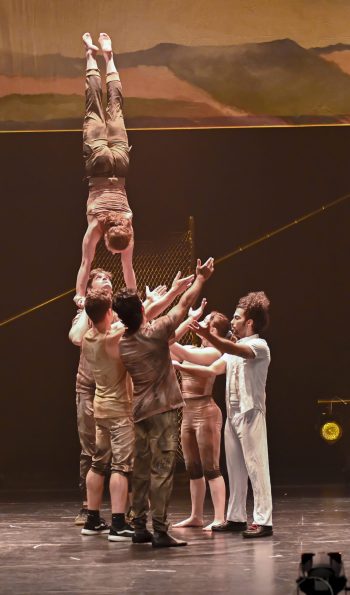
“It is a life and death situation,” Cruz said. “You are risking your life to shorten your journey.”
The Community
For the most recent performances of “La Bestia,” the Nouveau Sud company was augmented by internationally acclaimed circus artists who brought an extraordinary prowess to the acts and also mentored the “Suds,” as Cruz calls them. Supported by a Creation and Touring Grant from the New England Foundation for the Arts, “La Bestia” will begin tours next year to other cities, with projected performances in Chicago, Philadelphia, Houston, Montreal and cities in Mexico. But even as Nouveau Sud gains in professionalism and prestige, Cruz’s focus remains on Charlotte.
“We’re going to continue to dig deep to strengthen the local group,” he said.
Among the homegrown talent is Tykiique Cuthkelvin ’17, who transferred to UNC Charlotte from North Carolina Central University. Coming to UNC Charlotte “was a game-changer,” Cuthkelvin said, in particular because of the opportunity to work with Cruz. “It woke me up to how I could use my body, my physicality, to tell a story.”
In 2020, Cuthkelvin returned to Charlotte from Chicago to work with Nouveau Sud and joined the cast of “La Bestia.” He is motivated by Cruz’s commitment to social justice.
“Carlos really wants to tell a story that inspires people to get up and go make a difference. I think that’s a powerful thing.”
He also is challenged by the rigor of performing “La Bestia.”
“To get the audience to feel that they’re in Central America, to get them to feel that adrenaline, what it feels like to be on that journey, it’s really intense.”
After each show, the cast hosts a talk-back. In some cases, Rogden said, there are audience members who previously knew very little about migration from Central America.
“Hearing how shocked they were about the experience makes me feel like we are really accomplishing our goals.”
On other occasions, the audience has included people who have lived the story portrayed on the stage.
“One night, there was a husband and wife and three children,” said Cuthkelvin, “and the husband cried in front of all of us and said he was someone who went through a journey like this and now he could show his children what he had gone through. He said, ‘Thank you for risking your lives, for putting yourselves out there to tell this story.’”
The experience of “La Bestia” is fundamentally a lesson in trust.
The audience trusts that the performers will be successful and safe. The artists must trust themselves and each other to accomplish their astonishing acts.
“At the heart of circus is relying on others to complete the task at hand,” Cruz said, adding that it is also at the heart of the migrant’s journey.
“It is inherently human. We are meant to be in community and help each other.”
The Community
For the most recent performances of “La Bestia,” the Nouveau Sud company was augmented by internationally acclaimed circus artists who brought an extraordinary prowess to the acts and also mentored the “Suds,” as Cruz calls them. Supported by a Creation and Touring Grant from the New England Foundation for the Arts, “La Bestia” will begin tours next year to other cities, with projected performances in Chicago, Philadelphia, Houston, Montreal and cities in Mexico. But even as Nouveau Sud gains in professionalism and prestige, Cruz’s focus remains on Charlotte.
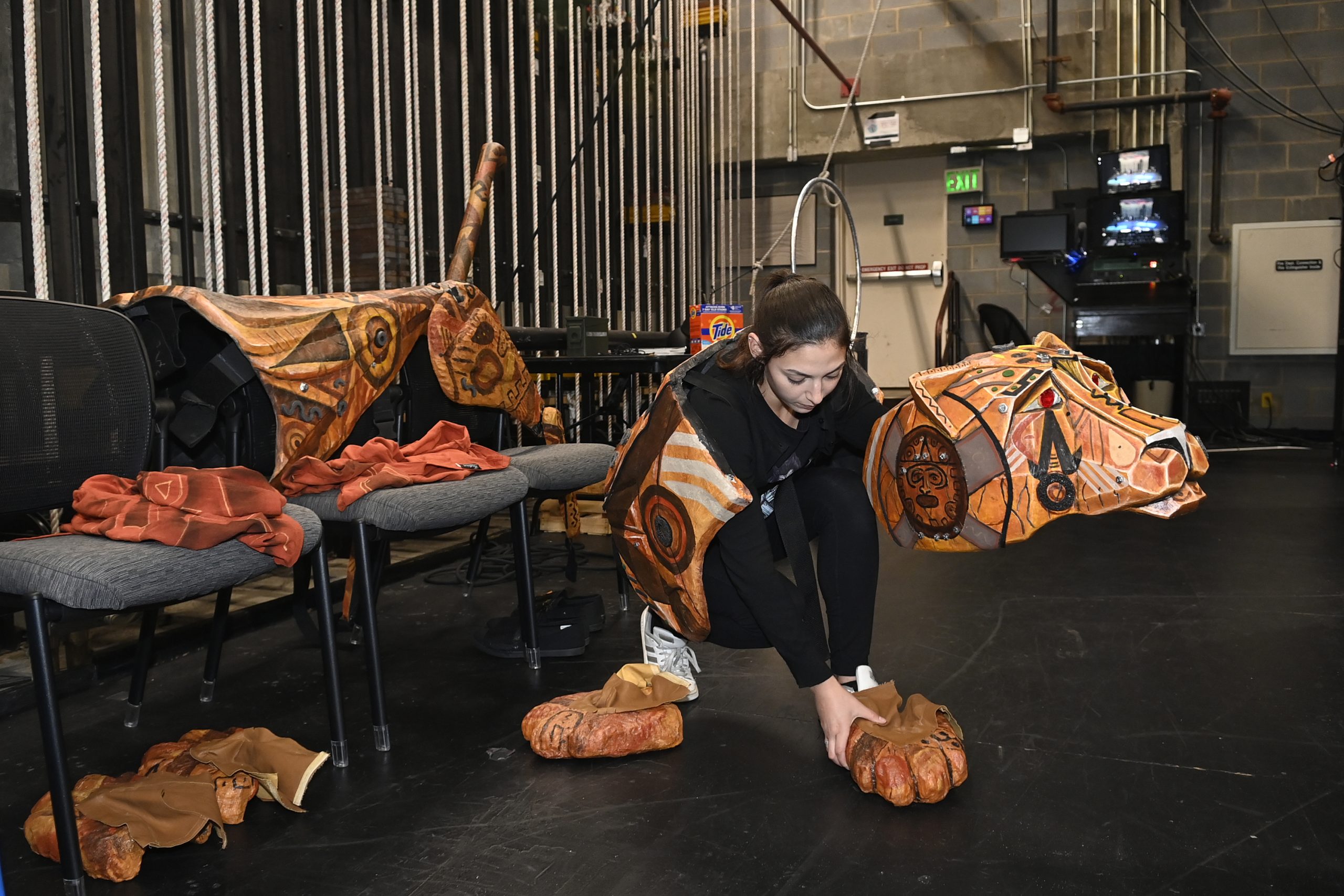
“We’re going to continue to dig deep to strengthen the local group,” he said.
Among the homegrown talent is Tykiique Cuthkelvin ’17, who transferred to UNC Charlotte from North Carolina Central University. Coming to UNC Charlotte “was a game-changer,” Cuthkelvin said, in particular because of the opportunity to work with Cruz. “It woke me up to how I could use my body, my physicality, to tell a story.”
In 2020, Cuthkelvin returned to Charlotte from Chicago to work with Nouveau Sud and joined the cast of “La Bestia.” He is motivated by Cruz’s commitment to social justice.
“Carlos really wants to tell a story that inspires people to get up and go make a difference. I think that’s a powerful thing.”
He also is challenged by the rigor of performing “La Bestia.”
“To get the audience to feel that they’re in Central America, to get them to feel that adrenaline, what it feels like to be on that journey, it’s really intense.”
After each show, the cast hosts a talk-back. In some cases, Rogden said, there are audience members who previously knew very little about migration from Central America.
“Hearing how shocked they were about the experience makes me feel like we are really accomplishing our goals.”
On other occasions, the audience has included people who have lived the story portrayed on the stage.
“One night, there was a husband and wife and three children,” said Cuthkelvin, “and the husband cried in front of all of us and said he was someone who went through a journey like this and now he could show his children what he had gone through. He said, ‘Thank you for risking your lives, for putting yourselves out there to tell this story.’”
The experience of “La Bestia” is fundamentally a lesson in trust.
The audience trusts that the performers will be successful and safe. The artists must trust themselves and each other to accomplish their astonishing acts.
“At the heart of circus is relying on others to complete the task at hand,” Cruz said, adding that it is also at the heart of the migrant’s journey.
“It is inherently human. We are meant to be in community and help each other.”
Meg Whalen is director of communications for the College of Arts + Architecture.
